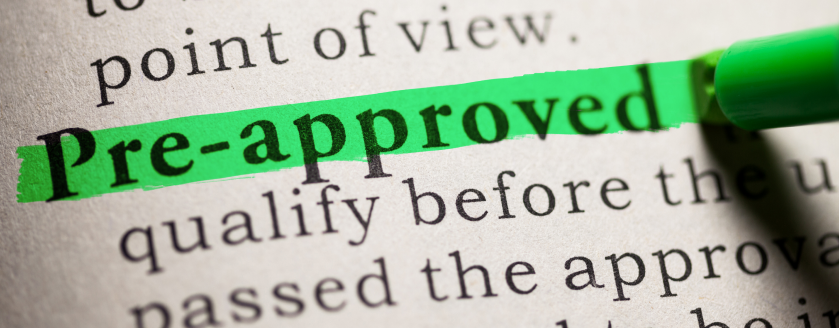Should You Apply for Multiple Preapprovals?
Written by:
Andrew Tavin
Andrew Tavin
Personal Finance Writer
Andrew Tavin a contributing writer for Own Up.
See full bio
Fact Checked by:
Mike Tassone
Mike is a Co-Founder and Chief Operating Officer of Own Up. He has expertise in all areas of residential lending, having led operations for a top 40 lender in the United States.
See full bio

“Are you preapproved?” is often one of the first questions a real estate agent asks when engaging with a new client.
With this question, the real estate agent is trying to determine the types of properties the client can afford and the likelihood that the transaction will ultimately close if the client chooses to make an offer. Since realtors typically work on commission, they also want confidence that their time is spent identifying homes the borrower can realistically purchase.
Enter the preapproval letter: a document created by lenders to help provide this confidence. Mortgage preapproval has become an essential component of any offer to purchase residential real estate, as it gives you a sense of the loan amount you can afford and shows potential sellers that you’re a serious buyer. It can even be helpful to apply for multiple preapprovals!
What Is Mortgage Preapproval?
Since preapproval literally means “at a stage before approval,” receiving one from a lender is not a guarantee of future mortgage loan approval, even though it is still an important step on the homebuying journey.
Unfortunately, the industry has not agreed on consistent standards of what constitutes a preapproval, let alone an acceptable process to create the document.
As the Consumer Finance Protection Bureau’s section on preapprovals and prequalifications says:
Some lenders may use the word ‘prequalification,’ while other lenders may call the letter a ‘pre-approval.’ Some lenders offer a prequalification letter based on unverified information that you report and will only issue a pre-approval letter based on verified information.
You can speak with a real estate agent if you’re uncertain about which mortgage lenders offer the type of preapproval you require and the types of financial documents you may need to provide.
What Is Required for Mortgage Preapproval?
Just as there are different standards for what lenders consider mortgage prequalification versus preapproval, there are also varying standards for the types of documentation lenders request, which may seem odd.
Because nearly all lenders qualify borrowers using universal guidelines from Fannie Mae or Freddie Mac, there should be little to no variability in how these preapprovals are generated.
While some institutions have a fairly rigorous system that requires a prospective borrower to provide pay stubs, bank statements, tax returns, and credit reports, others grant wide latitude to their loan originators in creating the letters. In these cases, gathering very limited information from the customer (often only a credit check and sometimes just a verbal request to stipulate income) has become the norm.
So, why is there no standardized approach for what should be a very standardized document?
Why Aren’t Mortgage Preapprovals Standardized?
Sometimes it may seem as though the preapproval process benefits lenders more than it does consumers. In part, this is because preapproval processes and letters vary from lender to lender, making it difficult for consumers to compare mortgage costs.
Imagine if every lender followed the same process and a preapproval letter from a national bank was produced in the same manner as one from your local credit union or mortgage company. In that scenario, a borrower could truly shop for the best rate instead of having to stick with one lender simply because that lender issued the preapproval letter.
While a potential borrower can receive a preapproval letter from one lender and then apply and close a loan with another, it is far more difficult than it should be. As a result, the vast majority of borrowers stay with the lender that issued their preapproval instead of shopping for the best mortgage rates.
However, you can make a different choice.
Can You Apply for Multiple Preapprovals?
It is possible, and applying for multiple preapprovals can even be beneficial. However, it does not come without risks.
“In my expert opinion, it is possible to obtain multiple mortgage pre-approvals from different lenders,” says professional real estate agent Eleanor Campbell. “However, whether or not it is advisable depends on the individual circumstances of each homebuyer, such as their credit score, income, and debt-to-income ratio.”
Regarding potential downsides, Campbell cites the Consumer Financial Protection Bureau, explaining that lenders may perform hard credit inquiries as part of the preapproval process. However, too many hard inquiries in a short amount of time can negatively impact your credit score, so if your credit history is less than ideal, it might make sense to stick to one mortgage preapproval letter.
If your financial situation can support the credit pulls, however, multiple preapprovals may help you during the homebuying process.
“I often advise clients to seek pre-approvals from more than one lender to compare the different loan terms and rates available,” says Certified Public Accountant Mark Stewart. “This approach can reveal variations in interest rates, closing costs, and other fees that different lenders might charge.”
Stewart used his personal house-hunting experience as an example, saying that he received three preapprovals from different lenders.
“I was able to use the lowest interest rate offered as a bargaining chip to see if the other lenders could match or beat it,” Stewart explains. “This is a common practice and is often quite successful.”
He suggests applying for each preapproval in a short time frame, e.g., under two weeks, to minimize the impact of multiple credit checks and give your FICO score time to bounce back before you fill out your official mortgage application. Additionally, FICO reports that pursuing multiple inquiries for a single line or credit may not have the negative impact that some fear:
Most credit scores are not affected by multiple inquiries from auto, mortgage or student loan lenders within a short period of time. Typically, these are treated as a single inquiry and will have little impact on your credit scores.
Be Sure to Shop Around
Whether or not you actually choose to apply for multiple preapprovals, you should absolutely shop around with different lenders and obtain several loan estimates. This ensures you find a monthly mortgage payment you can manage over the long term.
While an estimate will likely be less accurate if it doesn’t require you to submit any financial documents upfront, it should still provide some sense of how different lenders evaluate applicants based on their financial situation and the type of mortgage.
You may also want to pay attention to down payment requirements and closing costs to ensure you have enough savings to complete the underwriting process for the home loan you want to pursue.
Let a Someone Else Shop Around for You
There are platforms you can use to explore your mortgage options in a short amount of time.
Some financial services companies allow qualifying borrowers to enter personal financial information to help them explore multiple borrowing options at once. While this might not be a replacement for preapproval, it’s a perfect first step for getting a sense of your options and a great place to begin your home-buying journey.
The Bottom Line
Navigating this process can seem daunting for first-time homebuyers, but your loan officer should be willing to answer any questions you have. If they aren’t willing to help, you might consider looking for a different mortgage broker.
Remember to review the requirements for FHA loans, which might offer advantages over conventional loans depending on your personal finances.
Are you ready to start your homeownership journey?


